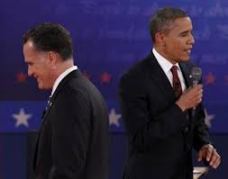CounterPunch, November 16, 2012
The longest, most expensive elections in one of the most polarized democracies in the Western world are over. Now we see contrasting reactions and unforeseen fallout––in the form of elation, bitter disappointment, investigation and resignation. The downfall of the CIA director David Petraeus and investigation into Gen. John Allen’s emails concern both their personal conduct, as well as the uncomfortable fit between President Barack Obama and the conservative military hierarchy.
Nonetheless the current turmoil at the top should not distract us from deeper analysis of American politics. The overwhelming nature of President Obama’s win over his Republican rival Mitt Romney in the Electoral College was achieved by a series of narrow but even victories in hotly contested states. A win by a small margin in a state can deliver all of the Electoral College votes, so the outcome is distorted rather like in Britain’s parliamentary elections, where a candidate can win by just one vote. It hides a greater truth––that the United States is a society split almost in two halves as its demographic transformation continues.
The Republican Party’s hysteria on a range of issues––from Muslims, Hispanics and other non-white communities to slogans of “small government” which threaten the vulnerable, low-income groups, women in particular––has damaged the social fabric of the United States and the party’s own prospects. The trend is most conspicuous in the presidential and senatorial races, where constituencies are huge. However, it is not so accurately reflected in the House of Representatives, where the Republicans have maintained their majority. The omens for President Obama are hardly better in the second term, for there will be fierce battles over the budget. The Republican majority will likely do all it can to thwart the president’s fiscal proposals, clouding his legacy.
The depth of polarization in American society is reflected in the overall vote. More than 90 percent of blacks and 70 percent of Hispanics and Asians supported Barack Obama. And 88 percent of those who voted for Mitt Romney were white. Yet the difference in the popular vote between the two was smaller than 3 percent. How can these numbers explain Obama’s solid victory over Romney and the Democratic majority in the Senate, but the Republican hold in the House?
Is it because the ethnic (white–black), ideological (Republican–Democratic) and economic (rich–poor) divides are reflected in the smaller House districts more accurately? Is it because House districts are more definitely white or mixed, rich or poor, rightwing or moderate? In other words, has segregation––ethnic, economic, ideological––in the United States widened? Or have other factors been responsible for a very different outcome in the House? An expert with intimate knowledge of the landscape may shed more light on this.
Many of America’s domestic afflictions remain as they were under President Obama’s predecessor George W. Bush––possibly with two notable exceptions. One is Obama’s rescue of the auto industry; the other his healthcare plan, which was compromised during the legislative passage. Its utility will be proven in time. Mitt Romney fatally damaged his presidential hopes by playing the politics of exclusion. Barack Obama helped his reelection by taking steps to rescue the U.S. auto industry and delivering a healthcare plan despite disruptions and dilutions by his adversaries. The former contributed to his victory in the industrial states like Ohio; the latter in states like Florida with large numbers of Hispanic voters and pensioners worried about healthcare.
Now that the victory has been achieved, what are the prospects for President Obama’s second term? I have alluded to the prospect of stalemate between the White House and Congress. The conservatives in the House showed dogged opposition to block Obama’s healthcare plan, resist tax proposals and thwart his presidency in the first term. Obama’s reelection has made the political right more bitter even as its support base shrinks. The real question is whether he will continue to be the compromiser-in-chief, reluctant to stand his ground and fight for the substance of his program. Or his goal remains that the headlines show his presidency in good light, so he can leave a legacy of his choice, not necessarily much needed solutions to problems at home and abroad.
In foreign policy, Barack Obama did not take long following his inauguration in January 2009 to get back in tune with the past agenda, albeit with some adjustments, seeking U.S. hegemony over the globalized system. Initial promises of solving the Israel-Palestine dispute, rapprochement with Iran and the wider Muslim world and elimination of nuclear weapons were either diluted or abandoned or not heard again. Aspirations of a better U.S. human rights record were managed by silence, disingenuous definitions of combatant and civilian, and covert operations.
Withdrawal of American troops from Iraq was accompanied by the surge in Afghanistan––and those drones in the skies of Pakistan, Afghanistan and elsewhere. President Obama’s announcement of a reduction in America’s military presence in the Middle East actually meant a switch to increased reliance on special forces, drones and other mechanized tools of war, often deployed off-shore. A game of deception in the wider Middle East enables him to turn greater attention to encircling China. Will Obama’s second term be very different from the first? Or will he continue to walk away from positions he appeared to take in the fist six months of his presidency in 2009? That is the million dollar question.
[END]



You must be logged in to post a comment.